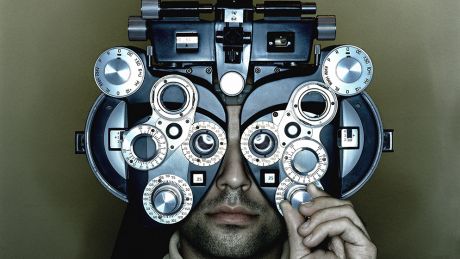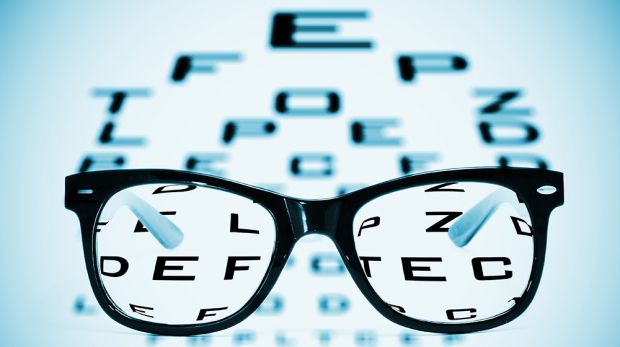How Healthy Are Your Eyes?
London's top eye doctors speak to Coach about what to watch out for

It’s National Eye Health week, a big date in the calendar for the professionals with that special little torch that makes your veins swim into view. We spoke to two about eye problems and how to keep your eyes in good nick.
Eye Problems
Declan Flanagan, medical director of London’s Moorfields Eye Hospital, on the issues that send people seeking out help from him and his team.
Colour blindness
Eight-to-10% of all men – it’s far less common in women – have some degree of colour blindness, where they cannot distinguish between certain colours. And unfortunately it’s totally untreatable. We often have people come in who didn’t even realise until well into adult life they had it to some degree, and we frequently hear from people crushed at how it forbids them from their chosen career as a pilot.
Floaters
Everyone has floaters – they’re the bits of translucent debris you can see in your vision that move with your eyes. They’re usually totally benign, but if you see black spots or you’re losing vision, you see flashing lights or you get a big one that persists, any of these signs can mean you have a serious problem with your optic nerve.
Short-sightedness
Most people who have vision problems readily recognise them, but if your eyes are only just in need of correction, it can cause discomfort – and we’ve had people come in who were failed on their driving test because they didn’t know they were short-sighted.
DIY
Something we often see is eye injuries from operating tools at home – usually, workplaces have strict health and safety procedures, but at home people can be more lax. If you’re doing anything involving machine tools or material that’s likely to violently fracture, I can’t stress enough the importance of wearing eye protection.
Conjunctivitis
This is an inflammation of the white surface of the eye, which can be either viral or bacterial. It’s easily treatable, but is highly contagious. We hear of epidemics in schools and offices all the time. If you’re infected, wash your hands frequently and use a separate towel to others.
Get the Coach Newsletter
Sign up for workout ideas, training advice, reviews of the latest gear and more.
Detached retina
This can happen for a variety of reasons, for example from blunt trauma to the eye in a sport accident. It’s treatable in 90% of cases, but the eye gets more vulnerable as you age. I’d suggest people stay out of fights in general.
Laser pointers
Aiming laser pointers at people can seem a lark, but people have been prosecuted for pointing them at the eyes of pilots as they come in to land. Children’s eyes are more vulnerable, and we’ve seen a few injuries from where they’ve been pointing laser pointers at each other.
Squash
A squash ball is the perfect size to fit into your eye socket and do some damage, and because of the way the game is played – two players facing the same way, maybe not aware of their opponent’s location – the racquet can cause damage as well. A sport in which eye protection is crucial.
Contact lens hygiene
This may seem obvious, but many people neglect their contact lens hygiene. This is a bad idea – there are very few foreign objects we deliberately place in such close and intimate contact with vulnerable parts of our body for such a period of time.
Bungee jumping
One thing we see now and again is people coming in with problems after going bungee jumping. It’s rare, but the sudden jolt, that radical deceleration from falling to being more or less stationary, can cause bleeding in the eyes and temporary visual problems. They do normally resolve, though.

What’s a Healthy Eye?
It’s not like you can exercise it, after all. Dr Nigel Best of high street optical powerhouse Specsavers patiently answers Coach’s questions
A lot of our readers will spend much of their day looking at screens. Is that harmful to the eyes?
Long periods of screen time, more with computers than TV due to the distances involved, can lead to computer vision syndrome. The symptoms are things like frontal headaches, eye strain, the inability to focus and a general irritation around the eye. Whenever we’re concentrating on a screen, our blink rate reduces. When we blink, we’re replenishing the film of tears on our eyes, so when we’re concentrating on a device, our eyes can dry out. An average person blinks 10 or 11 times in a minute but it can come down to twice a minute when sat at a computer. A young person can get away with it, but if you’re older it can be seriously detrimental, especially if you wear contact lenses on top.
RECOMMENDED: The Simple Trick Anyone Can Do to Avoid Eye Strain
What kind of symptoms should people look for as warning signs regarding their eyes?
There’s not a huge repertoire of symptoms – you just need to pay attention to what your eyes are telling you. If they’re gritty, uncomfortable, sensitive to light, or you lose part of your vision or experience frontal headaches with one of these feelings, it’s a clear sign something isn’t right.
What can people do to maintain healthy eyes?
Top of my list is not smoking. Smoking is a risk factor for older patients to develop vision loss or cataracts. To have healthy eyes, you are relying on a healthy vascular system. Patients who are diabetic or hypertensive are more prone to getting eye problems. Try to stay healthy, quit smoking and maintain good cardiovascular health.
Do cataracts ever affect younger people?
They can in exceptional cases, but they do usually affect people later in life. The coloured part of your eye, the iris, focuses light on your retina. When you’re born, it should be clear. As you age, it discolours and goes yellow, and this can cause visual impairment: cataracts. It’s straightforward to fix and is one of the most common operations done on the NHS.
Can you tell about other aspects of someone’s health from their eyes?
You can look directly at a person’s arteries and veins in there in a way you can’t do anywhere else in the body, and thanks to the optic nerve and the nerves that are part of the retina’s structure, you’re also looking at the central nervous system. You can see signs of high blood pressure, high cholesterol, or high sugar levels if someone’s diabetic.
So if not a window to the soul, at least to some other things?
Research found those with early signs of dementia had thinner nerve fibres than in patients without dementia. Brain tumours can change the appearance of the optic nerve.
Are eye exams a diagnostic tool, then?
The specific tests for things like blood pressure a GP can offer are far more sensitive than what we can do. We can see things that we suggest they get checked out, but it’s far from a perfect method of diagnosis. We see suspicious clues, rather than conclusive evidence.
